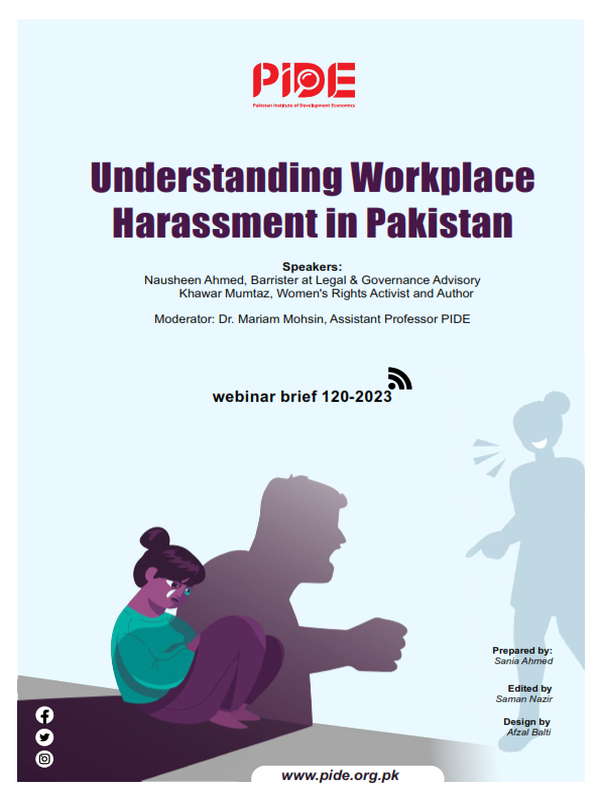Understanding Workplace Harassment in Pakistan
Speakers: Nausheen Ahmed, Barrister at Legal & Governance Advisory
Khawar Mumtaz, Women’s Rights Activist and Author
Moderator: Dr. Mariam Mohsin, Assistant Professor PIDE
What constitutes harassment? How prevalent is it in organizations all over the world and in Pakistan? What is the socio-economic impact of harassment on those affected by it? Do organizations institute any policies and legal procedures? What are the measures taken for education and accountability regarding consequences? The aforementioned questions will be addressed in this new series by PIDE titled ‘Understanding workplace harassment,’ where different speakers will be invited to each webinar. By conducting such webinars, PIDE envisions that organizations can foster a culture of respect, inclusivity, and safety.
Nausheen Ahmed:
- Harassment refers to unwelcome sexual advances, requests for sexual favors, verbal or written communication, physical conduct, or sexually demeaning attitudes that interfere with performance.
- Such actions not only create an unfavorable work environment but also serve as an attempt to intimidate and punish someone for refusing to comply with such requests.
- In Pakistan, the law only addresses sexual harassment. While the ambit of this law is narrow, many organizations have set up mechanisms to prohibit all forms of harassment, such as shouting and long working hours, which they categorize as misconduct.
- Another lacuna of the law is the lack of protection given to the complainant, as the law permits cross-examination of their witnesses.
- Organizations need to do their part in informing employees about their right to file a complaint at the ombudsman office, and even in instances where employees visit the ombudsman office, the response could be more efficient.
- After a complaint is filed, organizations are not supportive of protecting complainants, whereas the onus is upon them to provide a proactive environment for them.
- Several mechanisms are in place for the safety of complainants; these include maintaining their confidentiality, suspects can be sent on leave, and limiting interaction between defendant and complainant.
- The complainant also has access to medical and psychological assistance under the current law and can request someone in their organization to aid with the inquiry.
Khawar Mumtaz:
- Amendments in the 2010 case include broadening the ambit of the law by including transgender, gig workers, and domestic workers.
- Challenges arise in implementing the law as organizations rarely adhere to their code of conduct, and many employees need to be made aware of such a document.
- The dearth of harassment committees and their composition is a recurrent issue.
- To counter such impediments, standard operating procedures must be in place, along with a compulsory display of the code of conduct to every employee.
- Citing evidence in the absence of a third party or where the incident cannot be recorded places the complainant in a vulnerable position.
- Currently, there is minimal discussion on the misuse of the law and how to reduce the number of false accusations.
- Social context plays a major role in Pakistan, where outsiders lobby for individuals, thus decreasing transparency in cases.
- Penalties for suspects found guilty of harassment include termination; however, organizations have compromised depending on the employee’s seniority.
- False allegations that institutions mollify lead to the victimization of complainants, forcing them to resign because of the hostile work environment.
- An organization should be held accountable for instilling a culture that values respect regardless of gender or seniority and does not tolerate abusive behaviors.
- Moreover, organizations should be free from biases towards both parties before the case has been concluded.




